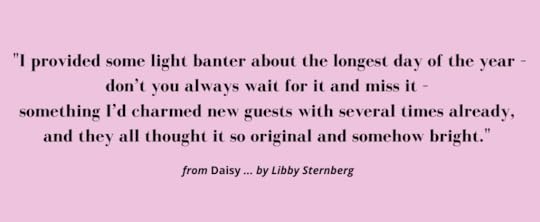Libby Sternberg's Blog, page 2
July 21, 2022
Listen to “Daisy”!
My novel Daisy, a refashioning of The Great Gatsby from Daisy Buchanan’s point of view, is now available digitally at Amazon, Barnes & Noble, Kobo, and Apple Books. It will be published in print this fall.
Some exciting new developments have happened regarding the book. First, it received a five-star review at the Reedsy Discovery site, with the reviewer declaring it a “must read.” You can read that review here. Here’s the squib:
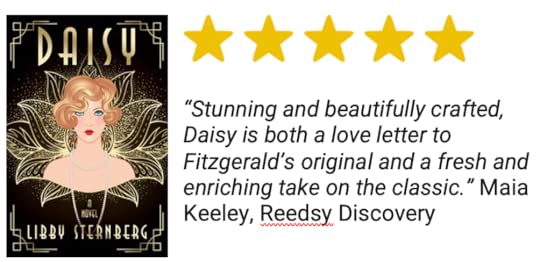
Then, based on that review and votes by readers, it was highlighted in the Reedsy Discovery newsletter.
That led to an actor, Maria Marquis, discovering Daisy and asking to audition for the audio book narrator. Maria’s audition is below, and you can read more about Maria here. But to hear her audition for Daisy, a reading of the first pages, click on the link below:
How exciting it was to hear Daisy’s voice, as articulated by this fine actor!
Finally, Daisy received a few more blurbs, these from academics. I paste them below, and hope this inspires you to give the book a read!
“Writing with grace and compassion, Ms. Sternberg reveals a much more human Daisy, who cares for the people in her life with a genuine depth of feeling. As she develops Daisy’s voice, the reader is pulled into her story to gain a new understanding of not just the literary character but the struggles and confusions women faced in the go-for-broke 1920s. Hearing Daisy’s version of the events of that summer in the East and West Egg leaves the reader with a new perspective on, and deeper understanding of, that frenetic time sandwiched between two world wars.”
Leslie Goetsch, assistant professor of English, George Mason University, and director of the Northern Virginia Writing Project.
“Finally, the story of Gatsby from Daisy’s point of view. Sternberg’s achievement of literary imagination is on the level of Jane Campion’s movie Bright Star, which told the story of Romantic poet John Keats’ final years from the point of view of his great love, Fanny Brawne. Wildly energetic and heartfelt, Libby Sternberg’s Daisy has the insight and audacity to alter and clarify key elements of Fitzgerald’s 1925 novel. The inspiring result is the revitalization of an iconic American tale.”
John C. Hampsey, Professor of British Romanticism, Cal Poly, and Author of the Boyhood Memoir Kaufman’s Hill
If you do give Daisy a read and enjoy it, consider leaving a review at etailer sites! Thanks in advance for considering that action, which means a great deal to all authors.
June 21, 2022
The longest day of the year
June 6, 2022
Regarding “intimidating” women
While writing my novel Daisy, I had an unpleasant experience with a man, the leader of an organization of which my husband and I were members. He thought it perfectly okay to inform me, as we disagreed over an approach to a program, that others found me “intimidating,” even “aggressive” and “pushy.”
He used “demure” to describe another woman, clearly implying that was the type he found admirable, obviously unaware of how that compliment is outdated, with its implication that women should be shy and quiet (staying in their place?).
Needless to say, we are no longer members of that organization, but his language in describing me, whether his own or ascribed to others, is depressingly familiar to many women.
I don’t consider myself aggressive or pushy or intimidating. I do try to be assertive, thorough, and intelligent. But many women, I suspect, have faced the negative descriptions mentioned above rather than the positive ones.
For example, a woman I know who worked in government for many years saw “aggressive” used on her evaluation sheets, but she was merely…well, assertive, thorough, and not just intelligent but Mensa-level smart. Similarly, a high-ranking woman to whom I related my tale of being described in those unflattering terms nodded her head in agreement and said she, too, had been called those things throughout her life. Yet she is a wise leader of both men and women, widely respected in her field and beyond.

Over at the Family Proof blog, I found a wonderful set of interviews with seven women discussing “what it means to be intimidating.” This response from Sara Baker, a PR pro, really resonated with me:
“…being intimidating as a woman is often thought of as a negative. It’s associated with being aggressive (as opposed to assertive), bossy (as opposed to direct) and intense (as opposed to firm). But why? Why does society place negativity on women knowing who they are and what they want? Men are not often deemed intimidating when they are assertive and direct, yet women ‘shouldn’t’ act that way…”
Sara Baker
From that same piece, I found Hailey Harmon’s response a head-nodder, as well, because it is the opposite of the “demure” label – women who are willing to speak up and speak out in many different settings:
“Intimidating is a word to describe women of being complex, outspoken, and strong willed. Intimidating can be many things, but for me, it means they’ve put themselves out there and aren’t afraid to speak their mind. To be frank, the people that say women are ‘intimidating’ seem to be living a few decades in the past.”
Hailey Harmon, founder of Aitch Aitch
So, when I wrote Daisy, a retelling of The Great Gatsby from Daisy Buchanan’s point of view, I thought of how her playing the “little fool” might have been her way of avoiding the “intimidating, aggressive” label. It allowed her to speak out. Women who use clever bon mots and witty lines to disguise their sharp intelligence and assertiveness, after all, are admired.
Several times in Daisy, I come back to this theme, of Daisy Buchanan having to hide her true self in order to fit into that “demure” box the men in her life have constructed for her and other women. In a scene where I have her husband, Tom, teaching her to sail, she has the nerve to suggest they might do things differently in order to achieve more speed:
“No one likes a pushy woman, you know,” he said after straightening out our course. I bit my tongue to keep from pointing out he had done what I’d suggested. Men didn’t like women who were right. I’d learned that early in our marriage, too. During a similar discussion a week or so ago, Tom had excessively squeezed my hand, bruising my finger. I was being too aggressive, he thought, by suggesting after dinner that maybe the white man wasn’t in danger of being oppressed.
From Daisy by Libby Sternberg
(In my own life, my husband has been both supporter and champion of my points of view, especially of my writing career.)
Later in the novel, Daisy herself realizes, though, that she has been complicit in keeping herself in that box, by not being her genuine self:
All the things I’d wanted from life I had gotten by playing that porcelain figurine. I’d bent in that same charming way toward men. I had lidded my eyes, bitten my tongue, looked shyly away, come up with clever lines, ceased being in any way intimidating. All so they’d love me.
From Daisy by Libby Sternberg
Just as in real life, Daisy, like many women, has to choose whether to be demure or all those negative things (mostly) men say about women they can’t easily control. Writing her character proved to be cathartic for me after my unpleasant experience. It helped me explore how women deal with men who revert to stereotyping when confronted with women who disagree. I hope the novel has other women nodding their heads to Daisy’s journey.
Daisy is available digitally in July and in print in September.
May 19, 2022
Will someone, please, ban my book?
Recently, The Great Gatsby appeared on a list of books people want cut from reading lists.
Quelle horreur! More book banning? Where are my pearls so that I might clutch them? My upcoming novel, Daisy, is based on that wonderful novel!
Actually, the list that includes Fitzgerald’s classic comes from teachers, librarians, and other educators who responded to a School Library Journal survey about summer reading lists. Those experts were concerned about students who don’t connect with the “classics” and might need more relevant reading to keep them interested over the summer.
As much as it pains me to say it, they have a point. If the goal of summer reading lists is to avoid the “summer slide” of lost reading achievement, then maybe books on such lists should include exciting and relevant choices.
The SLJ survey demonstrates a process, however, that school boards and libraries go through all the time. They regularly cull their shelves, trying to make room for new books, while evaluating whether the content of some is appropriate.
Sometimes these efforts wander into challenging territory. A Tennessee school district, for example, proposed banning the Pulitzer-prize-winning Holocaust-themed graphic novel Maus in January, not because they didn’t want children to learn about the Holocaust but because of what some on the board saw as age-inappropriate content (they objected to some language and images in the book).
This and similar efforts to remove books from schools and libraries always create an uproar, but I wonder if it’s always justified.
Take the Maus ban, for example. First, if I’d been on the board, I doubt if I’d have voted to ban it. But I wouldn’t have sneered at those who, taking their responsibilities to children in their district seriously, were concerned about inappropriate material for certain age groups. To persuade them they are wrong in that belief means taking their concerns seriously, not mocking them.
I feel similarly when I hear of other book removals. A lot of them involve people working diligently to serve their districts as best they know how. Yes, sometimes they might be wrong. But they’re not akin to the Nazis of the 1930s who celebrated burning books from mostly Jewish authors. To act as if they are diminishes the real evil of those earlier actions.
They’re trying, as the respondents to the SLJ survey were attempting to do, to figure out how to choose books wisely for various age groups. (And, by the way, despite my agreement with the teachers’ and librarians’ goals in that survey, I don’t think Gatsby should be dropped from summer reading lists. Some students might be entranced by it. I was when I was younger. The same with Jane Eyre, another book on that cut list.)
Whenever these “book banning” stories appear, they seem to focus exclusively on certain books being challenged by certain officials. Others don’t get much attention at all. Yet, if people are truly concerned about a slippery slope of unfettered book banning, shouldn’t they also be upset about all book bans/challenges?
Don’t misunderstand me. I do think we always need to be vigilant against extremism, but that vigilance also means having the discernment skills to know when not to cry wolf at every book challenge (unless it’s for this wolf).
Now, back to the original point of this post, which is, of course, to promote my upcoming novel, Daisy. (Did I mention it’s available digitally this July and in print this September?) It’s been praised by Publishers Weekly’s BookLife fiction contest, where it was a quarter finalist, and you can find more about its story and see more praise on it at my author homepage. I would love for as many readers as possible to buy and enjoy Daisy with its strong message of female empowerment.
Sales of Maus soared when that Tennessee school board voted to take it off the shelves. Similar sales jumps have occurred in other books that have made the news for being challenged or banned.
So, please, take my book. And ban it.
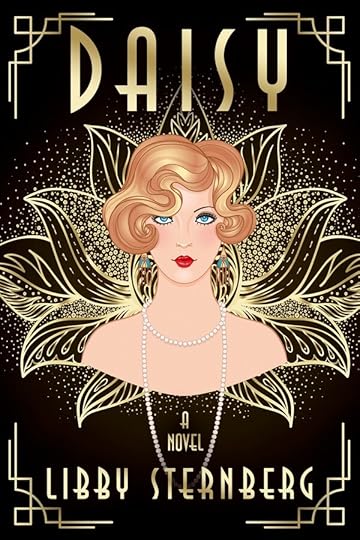
April 5, 2022
How dare you write that?
Before landing a publisher for my novel Daisy, I had several rejections from editors at various houses who were extremely complimentary about my refashioning of F. Scott FItzgerald’s The Great Gatsby. Their praise, however, was followed by the inevitable “but,” that could be summarized thus: Retelling such a great American classic is a risk.
I paraphrase, but that was the gist of their reaction, and I thoroughly understand their reticence, even if I disagreed with it. If they published a retelling of such a famous book, would they look foolish if it wasn’t extravagantly praised by critics?
Fortunately for me, I found a publisher as fearless as I was in writing this novel. Thank you, Bancroft Press.
Like those rejecting editors, though, I do worry a bit about the reaction to Daisy, if critics will like it, or if they’ll wonder: How dare she take on this sacred text? Who does she think she is?
Actually, for a long time, I thought I was a nobody in the writing world. Though I was often complimented on my writing ability, was making a decent freelance career of writing for various health care organizations and others, and loved writing fiction in my spare time (I penned short story after short story rejected by magazines), I didn’t give myself permission to write fiction seriously until I was in my forties.
For a long time, I thought successful–or at least serious–fiction writers were like Fitzgerald, graduates or attendees of Ivy League colleges who moved in a certain elite set of fellow writers and lived exciting lives.
I came from unfashionable suburbia and didn’t even have a liberal arts degree. (My two degrees are from a music conservatory — I hold a B.M. and M.M. in voice performance.) I was a wife and mother. I hadn’t attended any prestigious writing seminars or workshops. I didn’t know anyone in the fiction-writing world and didn’t know how it worked. I once sent a story to Simon & Schuster addressed to the “Fiction Editor.” That’s how clueless I was.
I’ve told this story before, but it was my sister who encouraged me to give novel-writing a go, investing the time and creative energy into it, and I started in genre fiction. My first adult novel was a romance (or chick lit, as it was labeled at the time) published by Harlequin. And before anyone criticizes romance, you should know I’m a fierce defender of that genre, mostly comprised of women authors who tell wonderful stories using a formula they keep fresh for readers.
My writing heart led me to other stories over the years, and I’ve charted two paths for myself. One is commercial fiction meant to appeal to wider audiences. I landed a film deal for one of those books, a romantic comedy titled Fire Me (no film yet, alas, but it provided a nice payment to me).
The other path I’ve trod is what some call upmarket fiction, stories that appeal to readers looking for tales with perhaps more complex themes and no guarantee of happy endings. My success in that area has included critical praise, some prizes, (BookLife quarter finalist for Death Is the Cool Night) and the Huffington Post including my retelling of Jane Eyre, titled Sloane Hall, in a list of only 14 books they highlighted on the 200th anniversary of Charlotte Bronte’s birth.
That bring us to Daisy, a book that falls into this upmarket category. By the time I got around to writing this story, I was beyond giving myself permission to write. I just wanted to hear Daisy’s story, and since it wasn’t available, I wrote it myself.
I wasn’t thinking about how daring it was to retell this great classic. I just wanted to see and hear Daisy speak. So I gave her words and told her story. Because by this point in my life, I’ve come to the conclusion that it doesn’t matter that I didn’t go to Princeton like FItzgerald, that I don’t pal around with famous literary writers, that I don’t move in the writing seminar crowd. I’m a writer. A novelist. That’s all you need to know.
Recently, I came across the quote below from Neil Gaiman that really speaks to me. This is who I aspire to be now after finally giving myself permission to be a novelist years ago. I strive to write with assurance and confidence. So of course I wrote Daisy, a story of a woman learning to find a new assurance and confidence in her own life.
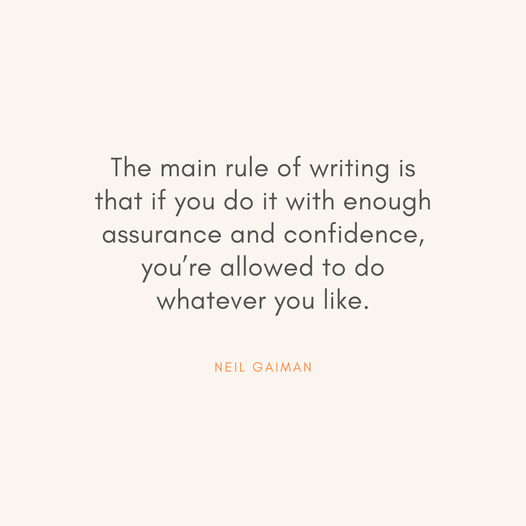
Daisy by Libby Sternberg will be released digitally in July and in hardcover in September, published by Bancroft Press.

March 31, 2022
Book Dedications
Authors often dedicate their books to loved ones or people who helped them along their writerly journey. I dedicated my first adult novel to my husband, and others to various family members who’ve supported this writing habit of mine.
My current novel, Daisy (which will be published digitally in July and in hardcover in September 2022), is dedicated thus:
To Truman, Penny, Mina and Winnie
Those are my sweet grandchildren. The oldest ones are beginning readers, and I have no doubt they will all be voracious book devourers over time. Although Daisy is not a young adult or children’s novel, I wanted them to see their names in print in an actual published book. I hope it inspires them.
Other authors have taken different approaches to dedications, and the website Bored Panda has a list of 57 book dedications, some of which are hilarious. My personal favorite was the book of poetry ee cummings dedicated to the fourteen publishing houses that had rejected it.
Here’s another that made me laugh out loud:
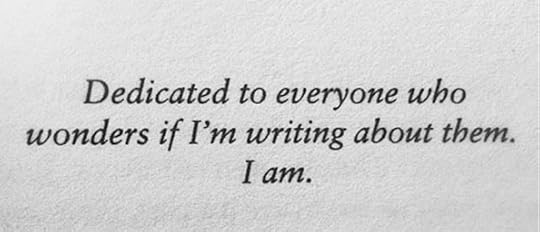
Not only did I laugh at that dedication. I also nodded my head. Although novelists are writing fiction, what author can resist the temptation to use unpleasant people they’ve encountered in life as inspiration for unpleasant people they write into their stories?
So, beware if you are friends or family with writers. This t-shirt sums up the risks:
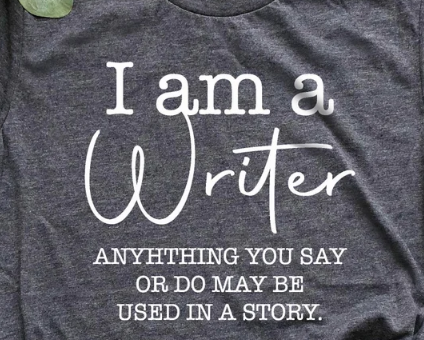
Maybe I should get myself one of those!
Don’t forget — Daisy is available this summer and fall, published by Bancroft Press. The Great Gatsby told from the perspective of Daisy Buchanan: “A delightful portrayal of a female character claiming the story as her own, repossessing her own voice.” BookLife Prize Contest

March 27, 2022
Promoting “Daisy” and Things to Watch
My publisher is sending me about a dozen ARCs (advance reader copies — uncorrected copies of a book sent out for promotion and reviews) of my novel Daisy, so that means I should start doing some promo myself for this novel.

I’m very excited about its release later this year (first digitally, then in print in September), but, as usual, I’m stumped as to how best to communicate that excitement to potential readers. Should I look for “influencers,” do more social media, wear a sandwich sign and walk around a mall promoting the book?
Probably. But I don’t know many influencers, don’t do TikTok, barely do Instagram, read Twitter but rarely post there, and, well, I don’t look good in a sandwich sign.
So here I am at my blog wondering what to say to communicate how passionately I feel about this story, Daisy Buchanan’s telling of The Great Gatsby tale, how much I want the whole world to read her view, her coming to terms with learning to be stronger, more independent, less a “beautiful fool.”
Because I recently shared with some relatives some information on series I’ve enjoyed watching, I thought I’d start there, with recommendations for good TV shows, all coupled with how they relate to Daisy. These mini-reviews allow me to mention my novel…a lot. That counts as promo, right?
Around the World in 80 Days: A refashioning of the Jules Verne tale, this series is updated to include a feisty “reportress” among the travelers. A little slow at first, but it has a wonderful character arc for Phileas Fogg. Daisy‘s protagonist is a feisty woman, too. If you like seeing women coming into their own during difficult times, you might enjoy this series and my novel, Daisy.
All Creatures Great and Small: An update of the original series based on the lovely James Herriott novels, this series (season two of which is available now for streaming) is a little predictable and “cute,” but so peaceful and sweet, it’s hard not to binge on it. Daisy might also seem predictable if you have read the great masterpiece on which it’s based, but you’ll also find diverging plot points from the original, and, of course, a more fuller exploration of the main character, Daisy Buchanan.
Reacher: A series (not the movie) based on best-seller Lee Childs’s character, a veteran who’s so stoic you wonder if he’s on the autism spectrum, solving a mystery in a small Southern town. Violent but very satisfying in that all the bad guys get what’s coming to them. In Daisy, some characters do get what’s coming to them, and there is the hint of violence, but nothing rising to the level of this series. So if bloodshed isn’t your thing, Daisy is for you.
Ted Lasso: This is a gentle comedy about an American college football coach and his assistant hired by a British soccer team. Ted is an unapologetic optimist and good person, and he ends up changing all those around him, usually for the better. The only unapologetic optimist in Daisy is, of course, the doomed character Jay Gatsby. Oh well. You still might enjoy Daisy.
Inventing Anna: Series based on the true story of a woman who passed herself off as a German heiress, scamming many of New York’s elites, this show keeps you watching even though you Google the outcome. Daisy is like that, too. You might know the arc of the story if you read the original, but you still want to find out how the micro adds up to the macro, how Daisy reinvents herself.
The Last Kingdom, Season Five: Uhtred fights in various places in England. Nuff said. It’s on Netflix. Daisy does not have a single sword-wielding character, but she does end up charting her own destiny, not leaving it up to the Fates, and she has to fight her own internal battles to reach her goals.
On my to-watch list:
Wait for Your Laugh: Documentary about Rose Marie, actress, singer, comedian, best known for playing Sally Rogers on the Dick Van Dyke Show. Amazon Prime. Daisy is quite a witty character–did you notice that, reading the original? She has some great, slyly funny lines, and in my novel (did I mention it’s called Daisy?) she offers some well-placed bon mots, as well.
Lucy and Desi: Documentary on Amazon Prime. Daisy is a great love story, too, but in my novel she has to learn to love herself…as soon as she determines who she really is. In Daisy. The novel. By me.
Bridgerton Season Two: A romp of a romance set in Regency England, some watchers have dubbed it “Bangerton” for, well, you know. Netflix. Are there sex scenes in Daisy? Well, you’ll have to read it to find out!
Daisy by Libby Sternberg. Available for preorder at Amazon and Barnes and Noble
and maybe other places, too.
Phew, glad that bit of promo is done!
January 25, 2022
Choosing a cover for Daisy…the winner is…
I asked readers to help my publisher and me choose a cover for my novel Daisy, a reimagining of The Great Gatsby from Daisy Buchanan’s point of view. The responses were wonderful — so thought-provoking. Yes, we do judge books by their covers. We judge whether to pick one up and peruse it or to click on its image to read more about it.
Our little survey produced a clear winner, and I’m happy to reveal the cover of Daisy below. The cover design is by Jaycee DeLorenzo of Sweet ‘n Spicy Designs.
Those who voted for it were attracted to its clear Art Deco look, the vibrancy of the image, the contrast of gold and black.
As for me, I like all those things but also like how Daisy is staring right out at the reader, not averting her eyes or looking over her shoulder. Speaking of that latter look, however, several people who voted for the image of a real model glancing back over her shoulder found her appealing because she was real — not an artwork image. I liked that aspect of that cover, too, but in the end worried about whether it would look too much like the cover of a young adult book, when Daisy is adult fiction.
Whatever your preferences, mark your calendars: Daisy will be available in digital format in May and hardcover in July through the usual e-tail spots and brick and mortar stores that agree to stock it. Bancroft Press is the publisher, and I could hardly be happier with this quick publication schedule! When it’s finally released, I’ll be posting the news hither and yon. Stay tuned!

November 27, 2021
Book Review: Glory for Me (MacKinlay Kantor)
by Libby Sternberg
The Best Years of Our Lives won eight Oscars in 1947, including ones for best picture and best actor (Fredric March), all well-deserved. The film’s story of three veterans returning from World War II and finding readjustment to civilian life difficult is both tender and slow, with a plot as wandering as the hearts of the men it spotlights.
The movie is based on a novella called Glory for Me by MacKinlay Kantor. It’s a long free-verse poem, actually, that brings to mind the style of Walt Whitman (the author references him in the poem itself), chronicling the first months at home in the fictional Midwestern town of Boone City of the three main characters:
forty-something Al Stephenson, drafted at the age of 38, who is prouder of making sergeant than of becoming a vice president of the Cornbelt Bank; twenty-one-year-old Fred Derry who comes from the wrong side of the tracks but rose to lieutenant as a bombardier stationed in England; and young sailor Homer Wermel who is left a “spastic” after his ship went down. (In the movie, Homer is an amputee, and was played by the veteran Harold Russell, who’d lost both arms in a training accident during the war).Glory for Me differs a bit from the movie, but the overall gestalt is the same–three men who’d been so eager to get home realizing they don’t know what home is anymore after witnessing struggles they never could have imagined.
Al Stephenson’s memories are made more real in the book than in the movie, as he recalls the many men lost in battle during his tour of Africa, Italy and Germany, often in gruesome ways.
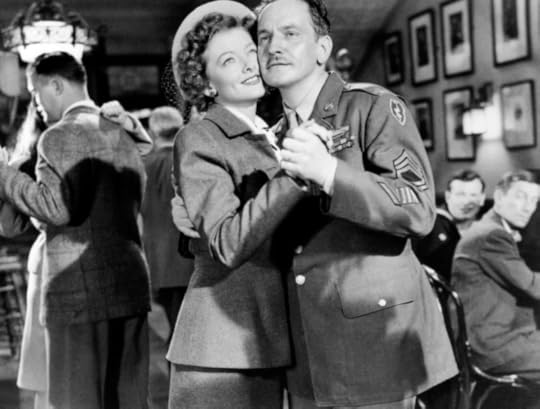 Myrna Loy (as Millie Stephenson) dances with Fredric March (as Al Stephenson) in The Best Years of Our Lives, the movie based on Glory for Me.
Myrna Loy (as Millie Stephenson) dances with Fredric March (as Al Stephenson) in The Best Years of Our Lives, the movie based on Glory for Me.Both Al and Fred Derry, in fact, often go through litanies of names, men whose planes went down or whose bodies were blown apart. How can they find happiness knowing so many lost the chance to grab it again?
“I was a bombardier,” he told himself,
A whisper that the engines shouted back.
“I was a bombardier and did my job.
Now I’m alive and Clark is not.
Neither is Stein, nor March, nor Callahan,
Neither is Olsen.
“Glory for Me”
Fred Derry’s challenges are compounded by his lowered station in life. A man who mingled easily with British upper class, he now finds himself back at the drugstore where he worked as a teen, a job that diminishes him after he had been trained in a highly technical field at a job he did well.
And how much bombing will they want in Boone? They didn’t want a bit.
They only wanted you to glide attentively from counter to the soda booth
Back to the front, to Anacin, to Kleenex hoard, to drugs and sundries…
“Glory for Me”
Homer’s struggle, of course, is the only physical one, and his inability to speak or move well due to his injuries makes him a subject of pity, which he loathes.
The free verse style gave this novella a dream-like quality at times that suited the story. Much of it occurs within the minds of the three main characters, and their disjointed, poetic thoughts serve the narrative well.
If you’ve watched the movie, you know each story ends well, so I won’t give away anything to note that similar upbeat denouements are in store in this novella–but not in quite the same way as in the film.
Glory for Me is a great companion to the movie based on it, but it stands alone as a must-read for anyone seeking to understand and empathize with veterans of foreign wars. I highly recommend it.
Libby Sternberg is a novelist.
October 4, 2021
An interview about Daisy
Twenty questions for Libby Sternberg on her novel Daisy
Master’s Degree writing student Andrea L. Dorten interviews me about my novel Daisy, an exploration of the Daisy Buchanan character from F. Scott Fitzgerald’s The Great Gatsby. Daisy is being read now by several editors.
How much research did you put into Daisy?
I think I’ve been researching this book all my adult life. By that I mean, I’ve read as much as I can by and about the Fitzgeralds ever since I fell in love with The Great Gatsby as a young adult. I’ve read all his novels and most of his short stories (there’s a nod to one, “Bernice Bobs Her Hair,” in Daisy). I’ve read Trimalchio, the first iteration of Gatsby, The Crack-Up, The Last Tycoon (which reminded me of Gatsby), as well as Nancy Milford’s excellent biography of Zelda and countless other books I can’t even remember now. I was kind of obsessed with the Fitzgeralds throughout my life. Don’t judge. 
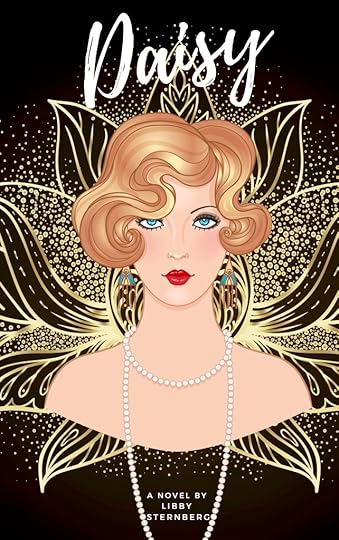
When I started writing Daisy, I did look up some things about World War I, and after I’d finished writing the book, I read Maureen Corrigan’s So We Read On, about the writing of Gatsby and more. What an astonishing book! I was nodding my head so many times reading that work and I need to write her a fan letter!
What inspired you to write The Great Gatsby from Daisy’s point of view?
I was intrigued by who Daisy really was and wanted to explore her character, and I knew that the original novel was entering the public domain, so it seemed the perfect time to start that exploration.
How did you get into Daisy’s head in order to write her version of the story?
I heard in my head her witty banter first, how Fitzgerald wrote her, sharp as a tack, but also…tender. There’s a moment in The Great Gatsby where Daisy complains about how awful things are, how she’s seen and done everything, and she ends by declaring, “Sophisticated—God, I’m sophisticated.” But to me, that always felt like a cri de coeur, Daisy passionately pleading for who she used to be as a young woman, happy-go-lucky, beloved, and, yes, tender, before the world—leaving Gatsby for Tom and Tom himself—hardened her. So I wanted to explore that aspect of her personality, her vulnerability.
How do you hope readers will resonate with Daisy?
I think all writers want readers to love their story and characters as much as they do, so I’d love for readers to love Daisy, sympathize with her, understand her struggle, and, even though this is set in the 1920s, maybe draw inspiration from that struggle as she tries to find the courage to become independent.
What was your favorite part about writing this novel?
Discovering who Daisy really was. Though I had in mind a general idea of who she was and what would ultimately happen to her, characters can come alive for you as you’re writing and lead you down different paths than you originally envisioned. In fact, whenever I’ve suffered from writer’s block while writing, it’s usually because I’m trying to superimpose on a character something that doesn’t fit, if that makes sense. With Daisy, she became more real as I wrote, and she drove the plot.
What was the most difficult aspect of writing Daisy?
Respecting the original work without trying to imitate it was the most challenging part of writing Daisy. But I also struggled at times when I felt her character pulling me in directions away from the original. I love the original so much, sometimes it felt like a betrayal to go off in a direction that was at times antithetical to the story Fitzgerald originally told, even in smaller details such as Daisy’s reunion with Jay. In the original, it is a little different from how I wrote it. So even though I knew this had to be my story, not just a reiteration of the original, it felt as if I were cheating on the original to turn my back on certain plot points, leave some out, or deviate even in small ways.
Did you know exactly how Daisy’s story was going to end?
No, not at first. I had a general idea of how I wanted it to end, with Daisy more in charge of her fate, but it took writing the entire novel (and the editing, rewriting process) to discover how she’d take control.
Given the fact that Daisy is an homage to The Great Gatsby, what tips do you have for writers who are hoping to write their own homages?
Don’t merely rewrite the original. Write your own story in your own voice. Deviate from the original where your story requires it, especially in areas where you might have dared to disagree with the original author’s storytelling. I’ve seen retellings that are just a point-by-point reiteration of originals and they feel like school assignments to me.
Not only did you get to write Daisy’s point of view, but you also spent a significant amount of time writing both Tom and Gatsby. Which character was the easiest to write through Daisy’s eyes?
I don’t think any of the men were difficult to write through Daisy’s eyes because the original had already given me (and readers) a good profile to use for all of them.
Which character was the most difficult to write?
Jordan Baker was a little more difficult to write because she, like Daisy, isn’t fully developed in the original.
How much did you want to stick to the original story?
I only wanted to stick to the outline of the plot of the major story, not its details. So of course the love story between Gatsby and Daisy is central to the plot, but her view of events and how she influences them is different.
Did you know where you wanted to deviate from the original source?
There were two major deviations from the original that I had in mind at the outset. One was to make Daisy a doting mother, not someone who merely wished her daughter grow up as a “beautiful fool.” Daisy’s love for her daughter is a driving force in my novel because it triggers a reevaluation of her relationship with Jay Gatsby.
The other deviation is who ran over Myrtle Wilson, who was driving the night she died. Fitzgerald’s novel is so, so beautiful, but that particular plot point – that Daisy was driving with Jay in the car – stretched credulity to me. On the way into New York, Tom seems afraid his wife would run off with Gatsby, so why would he let her head back home with him? There are other small changes, too, such as readers learning what is in the letter Gatsby wrote to Daisy before her wedding (which isn’t revealed in the original), and, of course, the biggest change is giving Daisy agency, making her more than an ornament.
With discussions about diversity and representation occurring, this novel containing the point of view of a woman in the 1920s is unique and much needed. How would you consider Daisy a feminist novel, if at all?
I’m not sure how one defines a feminist novel, but I did want Daisy to come alive for readers because in the original she is something of a sprite, not real, not flesh and blood. In the original, though, when we do hear her voice, she’s sharp and funny, so that was my foundation—to take this witty, intelligent woman and give her real feelings, real inner conflicts and debates, and to show her transforming throughout the novel from a dependent into an independent woman, literally charting her own course.
Was it difficult to keep a balance between being faithful to the original novel while also incorporating your own writing?
Fitzgerald’s book is so beautiful, as I keep saying, that my fear is/was that people would think I was trying to compete with it, when I’m not. I’m exploring one character in the book, her life, that Fitzgerald left unwritten. I wanted my writing to reflect the sense of the place and time, but I didn’t want to imitate him. So the voice is entirely mine without any attempts to copy or reference his language.
Part of Daisy’s challenge involves doing what she believes is best for Pamela. How big of a role did you want Pamela to play in Daisy’s decision?
As I noted above, having Daisy be a doting mother was one of the big changes I made, and it drives her relationship with Jay, how she views him and their future together.
What have been the challenges of writing throughout the ongoing pandemic?
I didn’t have any problems writing during the pandemic. If anything, it seemed right to use that time to write.
What tips do you have for aspiring writers?
Don’t give up. Set page quotas for yourself when you first start out – you can’t edit a blank page, and you can’t always wait for inspiration. And…get a good critique partner. When I first started writing, I found a critique partner with whom I became friends. She ended up being published first (by Penguin, a romance). I learned so much from critiquing her books, analyzing what worked and didn’t work for me, and, of course, her comments on my manuscripts were invaluable.
I’d also suggest joining writers groups, if you can find supportive ones. Learn as much as you can about the publishing business. It surprised me how much time I had to spend doing that – almost equal to the time I spent writing.
By the way, that critique partner lives in Kansas, far from me, and I’ve only met her twice in my life, though we email almost every day. We’ve “watched” our children grow up from afar and seen each other through publishing and life crises and celebrations.
What books do you recommend for aspiring writers to help improve their craft?
Strunk and White’s Elements of Style. LOL! Seriously, it’s thin, it’s chock full of good info on grammar and usage, and, yes, that’s important. The more you have “right” when you submit a manuscript, the more you control its ultimate presentation to the public. You need to learn the “rules” before you can break them. I do have a library of books about the book business—managing your writing career, that sort of thing, and those can be useful. Now you can find a lot of that information online, though—how to write effective query letters/emails, how to find the right agent, what to look for in a book contract.
Any hints on what is next to come in your career?
I’m one of those writers who doesn’t stay in her lane. I’ve written mysteries, historical novels, romance, women’s fiction, chick lit, and serious fiction like Daisy. I go where my writing heart leads me. Right now I’m writing a romantic mystery with faith elements, something more in the highly commercial fiction area.
Are you exploring the idea of writing homages to other classic novels?
Nothing inspires me right now to do that, but who knows? Maybe something will light the fire of inspiration for me. I have one other retelling in my history—Sloane Hall, a reworking of Jane Eyre set in old Hollywood. I loved Bronte’s novel (it and Gatsby greatly influenced me as a writer), and it’s the template for romance novels. I wanted to rework it so that readers would find the story fresh, even if they’d read or seen it a hundred times. I’m proud of that book. Originally published by a small press, Sloane Hall was one of only 14 books highlighted by the Huffington Post on the 200th anniversary of Charlotte Bronte’s birth. I was surprised they’d found it!
___________________________________
The BookLife Prize contest evaluation of Daisy:
Introducing a feisty protagonist with a girlish charm, Sternberg’s book shifts the storytelling genius from Fitzgerald to Nick Carraway, applying the Austenian concept of an unreliable narrator to The Great Gatsby. Sternberg requires readers to submit to layers of fantasy, by contrasting different realities in her still fictional world.
The author writes with a poised composure that reads like a continuation of Fitzgerald’s prose. However, the novel feels like a classical fusion of nineteenth-century literature with Jane Eyre’s direct address to the reader and Emma’s protagonist that cleverly orchestrates all things.
The author reconstructs a timeless American novel by adding compassion to Fitzgerald’s superficial relationships. Rather than defining her characters by wealth, she strips her story of financial interest and focuses on romance and female empowerment. Her book offers a new perspective that alters how one perceives Fitzgerald’s characters.
This book’s modernization applies the female agenda in today’s society to the social construct of the 1920s. It provides an inspirational heroine that escapes gender inferiority. In Fitzgerald’s novel, Daisy acts as an ornament to the male species, yet in this book, the author gives her agency.
A delightful portrayal of a female character claiming the story as her own, repossessing her own voice.

